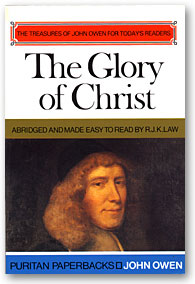 Another quote from John Owen. I'm in chapter 11 now - "The Glory of Christ in Restoring All Things".
Another quote from John Owen. I'm in chapter 11 now - "The Glory of Christ in Restoring All Things".Here he suggests the purpose for God creating "the Heavens and the Earth":
Thus “In the beginning God created the heaven and the earth.” He provided himself of two distinct, rational families, that should depend on him according to a law of moral obedience, and thereby give glory to him; with two distinct habitations for them, cognate unto their nature and use, — heaven above, and the earth beneath. The earth he appointed for the habitation of man; which was every way suited unto the constitution of his nature, the preservation of his being, and the end of his creation in giving glory to God. Heaven he prepared for the habitation of the angels; which was suited unto the constitution of their nature, the preservation of their being, and the end of their creation, in giving glory to God. Wherefore, as man had power and dominion over all things here below, and was to use them all unto the glory of God, — by which means God received glory from them also, though in themselves brute and inanimate; — so the angels had the like dominion over the celestial and ethereal bodies, wherewith God has fitted the place of their habitation, that through the contemplation and use of them God might have a revenue of glory and praise from them also. (Emphasis mine)
And then this quote about the fall of some angels, and the fall of all men:
This beautiful order in itself, this union between the two families of God, was disturbed, broken, dissolved by the entrance of sin; for hereby part of the family above, and the whole family below, fell off from their dependence on God; and ceasing to centre in him as their head, they fell into variance and enmity among themselves. For the centre of this union and order being removed and lost, nothing but enmity and confusion remained among them. Hereon, to show that its goodness was lost, God cursed the earth and all that was in it; for it was put in subjection unto man, who was now fallen from him. Howbeit he cursed not the heavens, which were in subjection unto the angels, because some of them only left their habitation; and the habitation of the residue was not to be cursed for their sakes. But mankind was wholly gone off from God.
The angels that sinned God utterly rejected for ever, as an example of his severity; the whole race of mankind he would not utterly cast off, but determined to recover and save a remnant, according to the election of grace... (Emphasis mine)
The first quote has got me to thinking about the "heaven and earth" distinction a bit more. (Owen references Ephesians 1:10, 3:15 and Colossians 1:20)
The second quote reminds me again of how strange I find this fact; that those who have a problem with God electing only some men to be saved, seem to have no problem with God electing none of the fallen angels to be saved. We cry "INJUSTICE" to the former, but smile piously at the latter.
The question to ask is not "Why didn't God choose all?" but rather "Why did God choose any?" Or better yet, "Why, oh, why, did God even choose me?!"
Answer: "to the praise of His glorious grace!"
Yeah, I was kinda caught off guard by that chapter; I sat there thinking, angels, moral status, sin, redemption, two distinct families... huh--?
ReplyDeleteOwen brought it all together nice though... Colossians 1:20